Jesper is a great guy and awesome knifemaker. I've had a pleasure to play with his customs, but this one is a production knife. Made in Europe and made with us in mind... should be legal in most (all?) European forests. I've been playing with Utvaer a lot in the field (well, even more than "juzt a lot") during long last weeks and it seems to be awesome bushcraft knife. It belongs to the fields & forest...
Review posted originally on PackConfig blog of my buddy from UK: HELLE UTVAER REVIEW and reposted below for you guys...
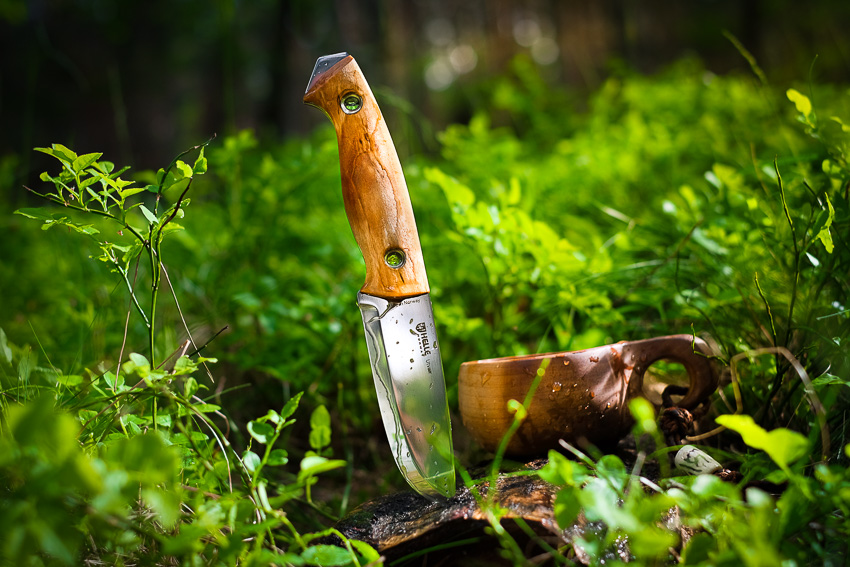
Scandinavian knives will always have a special place in my knife drawer. I remember when I joined the Boy Scouts and received my first belt knife, which was locally made and based on old military design, just scaled down a bit. During one of the summer camps we were visited by a Boy Scout group from Scandinavia and to seal our friendship we exchanged the knives. I received a traditional puukko with 4-inch carbon blade and birchwood handle. It was 26 years ago and yes, I still have that knife! I had to replace handle and make a new sheath, but I still have the scandi blade I was given 26 years ago. It was my first ever serious knife, which performs flawlessly even now after quarter of a century and serves as my forest cabin backup. When I discovered that one of my favorite European knifemakers, Jesper Voxnaes (known better just as VOX), designed a new scandi/bushcraft knife for Helle (a Norwegian manufacturer producing knives since 1932) I knew I had to get it in my hands as soon as I could. So here it is the Helle Utvær, displayed next to my own old puukko from Boy Scout times.
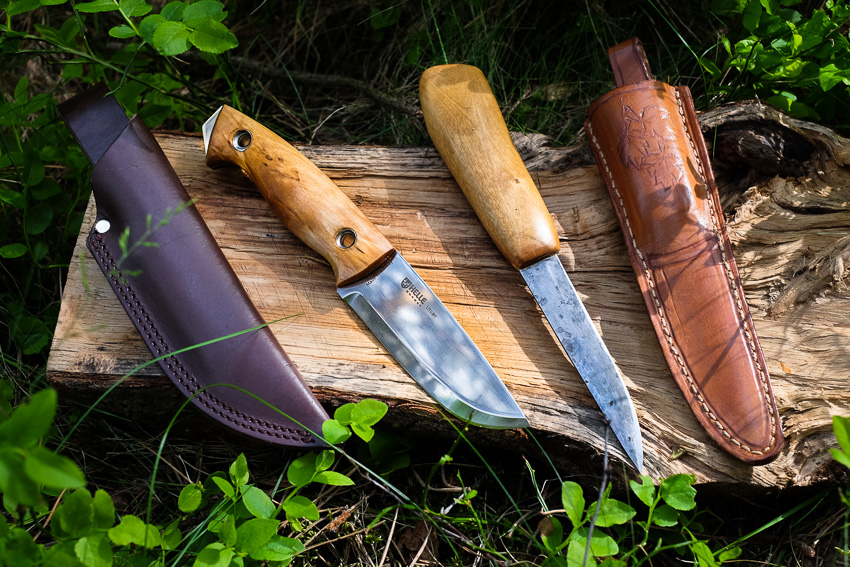
You can study all the technical specs on the Helle website: http://www.helle.no/products/knives/utvaer/
The Utvær comes in a standard Helle cardboard tube with a small brochure (including the history of Helle, knife care and sharpening instructions). There is also a square canvas cloth (possibly linen?) with company logo, which you can use for anything from wiping down your knife to a small tablecloth when preparing food on an old log in the forest. Yeah, I like the latter one, thats what Ill use it for. Thanks Helle.
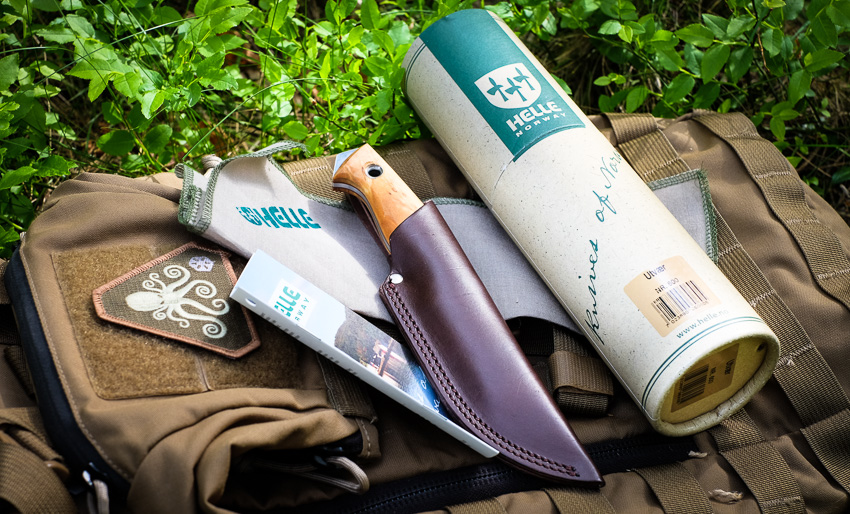
There is a strong trend towards tactical knives these days, especially in the US. The problem is that in more and more countries, especially within Europe, tactical knives are perceived by authorities as illegal weapon-like items, regardless of the intended use. So its more than welcome to see a modern, talented knifemaker co-operating with a traditional and well-established company on a knife. It blends a classic Scandinavian style with modern design and solutions. This is a knife you can take into the Great Outdoors, in practically any country and I cant foresee any reason youd be questioned about why you have it on your belt. It just looks like a traditional outdoor/hunting knife, with a semi-polished blade, birchwood handle and a leather sheath. There is nothing tactical in its look: no black handle, no serrations, no anti-glare blade finish, no pronounced guard, no G10 and no kydex sheath. Its a perfect knife for hiking through any field or forest of the World. Its also a true Scadinavian knife as it blends all Scandinavian countries into one knife: classic Finnish scandi grinds, Danish designer, Swedish steel and Norwegian manufacturer. I think its pretty cool.
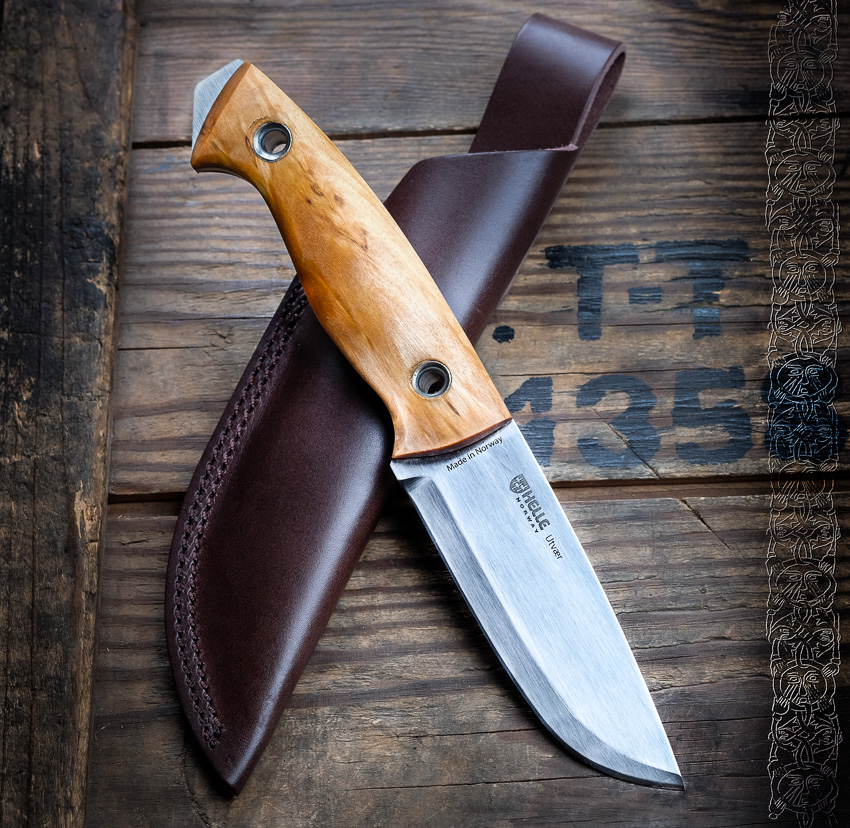
At first glance Utvær handle looks similar to other handles of Helle Knives. But its not the same. Utvær is a full-tang knife, so the steel tang goes through entire handle end-to-end. This ensures superior strength and longevity compared to traditional hidden tang construction (vide my first scadi knife, which had to have the handle replaced after I dropped it on a concrete floor and it cracked). But its also twice as expensive to produce because a knife producer can fit roughly only half of the number of blanks (compared to hidden-tang) on a standard steel plate for initial shape cutting.
The grip is traditional Scandinavian birchwood. The nicely grained and warm colored scales are fixed to the tang with two tubular bolts which gives you two potential lashing points. They are big enough to use not only with paracord, but even with a self-made thick leather thong or tendon string. And with two attachment points and a full-tang construction you can easily transform it into a spear if needed I doubt youd need a spear when hiking through a Scottish moor but what about backpacking in Bolivia or the Rocky Mountains? The handle is naturally shaped and really comfortable. It fills your fist nicely not too bulky but also not too thin or flat. Oil-impregnated unpolished wood is waterproof but it also gives a positive grip and its not too slippery, even when wet.
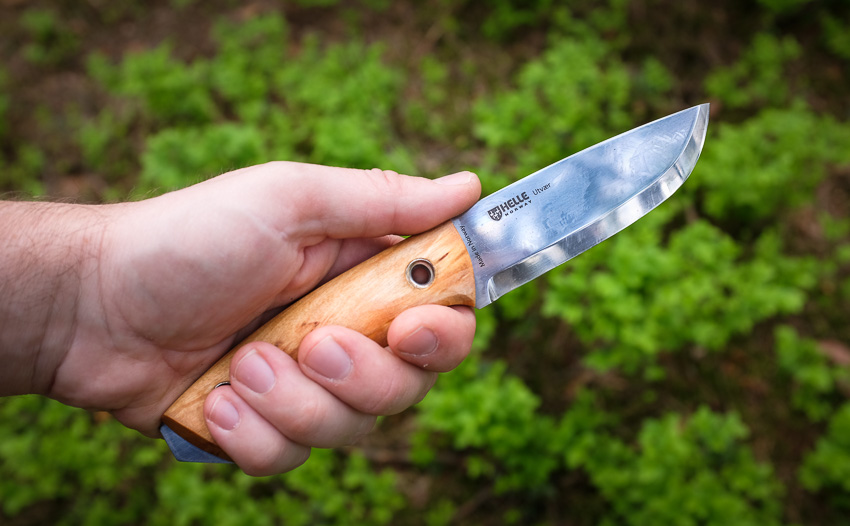
Another benefit of full-tang is the crusher at the pommel end its not only there for looks. You can use it to crush and hammer stuff (and save the blade just for cutting), to open metal container lids, break glass in an emergency, use it as a small wedge/prybar or even to strike a magnesium rod to start a fire. The Utværs 4.5-inch handle is equally comfortable with a straight, hammer and reverse grip, so you can use the blade and crusher for multiple applications.
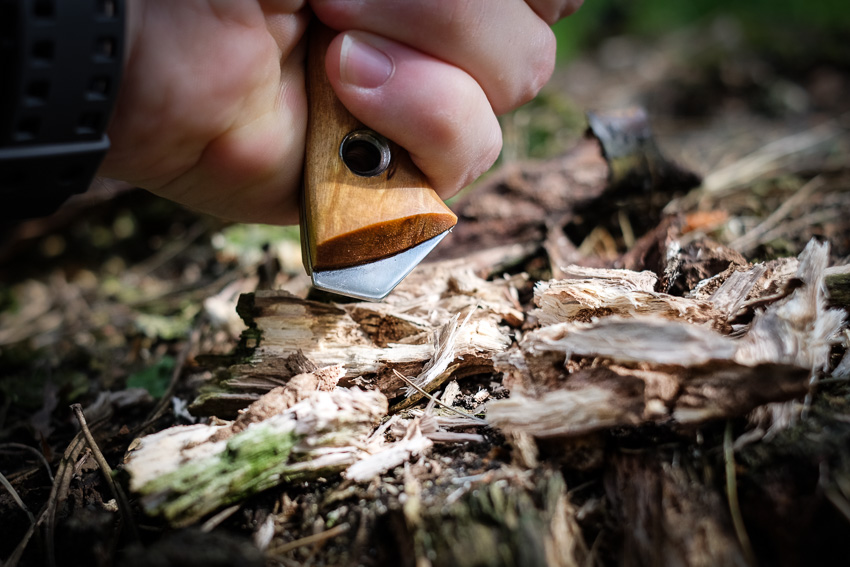
The blade is a soul of a knife. The Utvær has been equipped with 4-inch blade, which is 3mm thick and made of Sandvik 12C27 steel. The 4-inch size makes it legal in almost all countries and 12C27 is a very good European made alloy, which is corrosion resistant and takes a very sharp edge. Its a particularly good choice for a bushcraft knife as its really not hard to re-sharpen in the field and, as I said, it takes easily shaving sharp edge and holds it well above average during work. The tip is sharp and strong, the straight part allows for easy woodworking and the belly is suitable for skinning. Of course the Utvær has Scandinavian grind geometry, which means its sharpened to zero-grind with just the burr removed at the final stage (so without a secondary bevel). That makes it incredibly sharp and optimized for woodworking, whittling, preparing feather-sticks (to start a fire) and also cutting all kind of meats, foods, leather, ropes, green vegetation etc. The blade finish is a mix of polishing and ultra fine satin, which makes it easy to clean and (by polishing) increases corrosion resistance. It also looks more like a woodsmans tool versus matte bead-blasted tactical blades. Another benefit it can be used as a signaling mirror in an emergency.
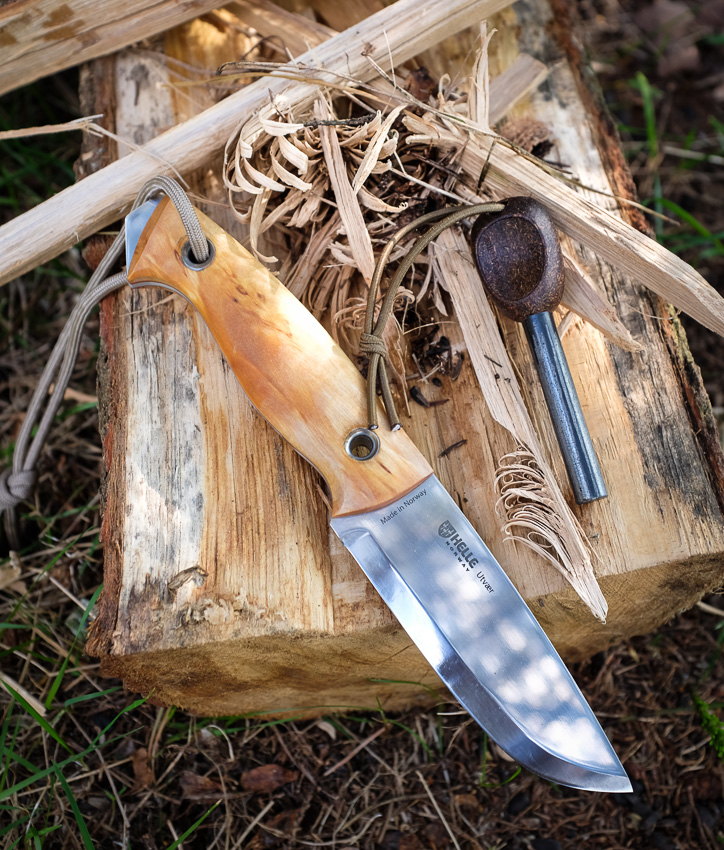
I tried it on many materials and I must say it really slices what you cut. First of all its a crazy-good whittler the comfortable handle transfers a lot of force to the polished zero edge and it just flows through the wood as if its cardboard. Take a look at the shavings here long, fat and smooth these were effortlessly cut off the pine stick. So the geometry of the Utværs blade is REALLY good for that.
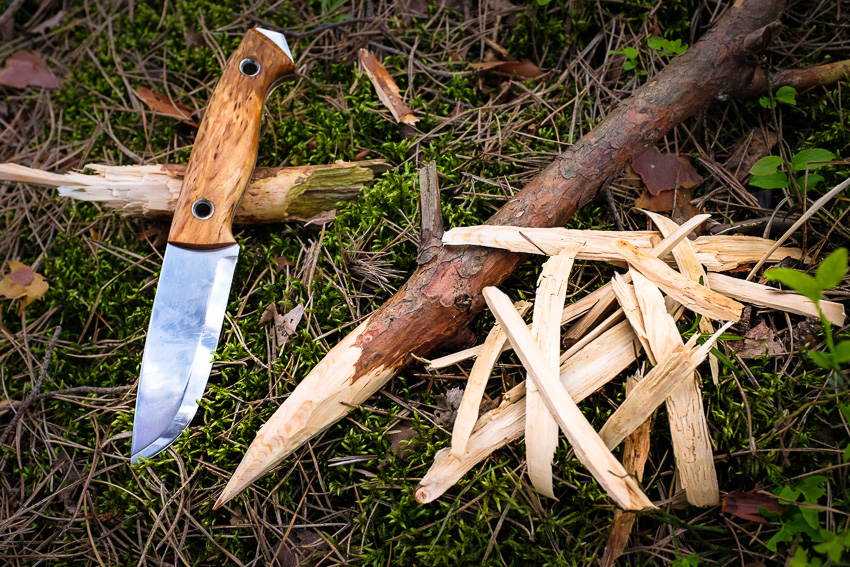
Cutting through hemp rope checks the blades sharpness and edge holding capabilities. I started to cut and after about 60+ straight cuts I stopped. It was still very sharp and cutting effortlessly that looked good enough to me, so no need to continue. Whats important is that the edge was not rolled, and most of the edge length was still shaving sharp. Its well above average compared to most cheap production bushcraft/boyscout knives with a scandi grind. So yeah, the Utvær would make a more than decent camp kitchen knife for food preparation, cutting, chopping. But it would also work for spreading butter, crushing garlic etc. thanks to broad flat profile.
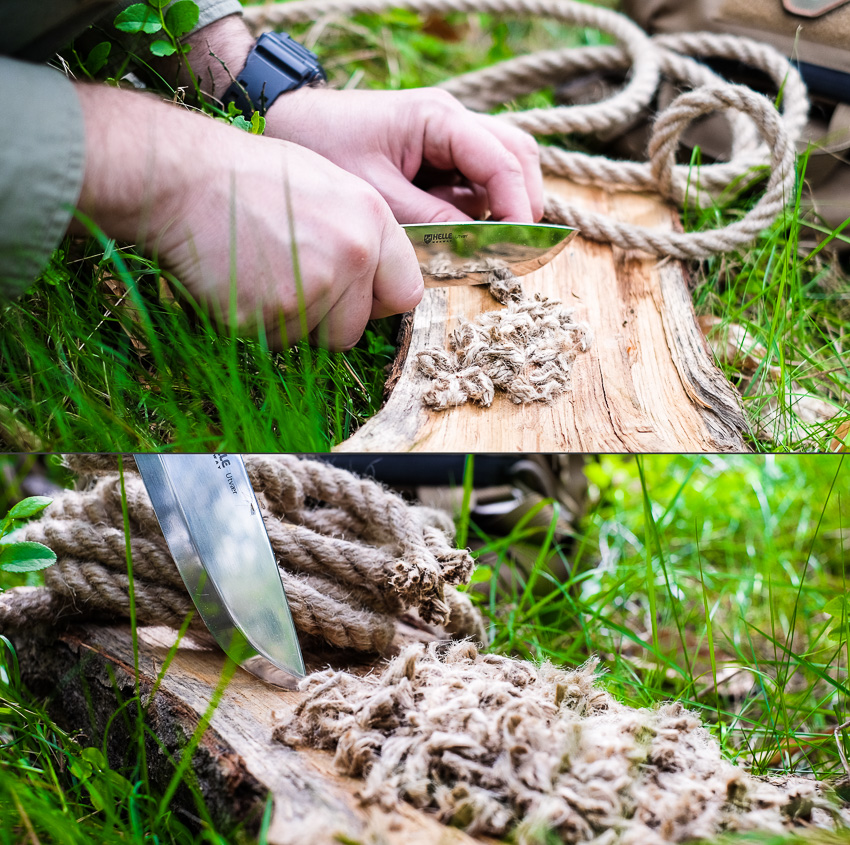
But there is much more you can do with the Utværs blade! What about preparing a fire? Its not a big blade but the full tang combined with good steel and broad profile means it is even good for some batoning. It was not a problem at all to split 2 inch wood pieces into splinters as you can see in the picture below I was hitting it hard enough to leave some clear marks on the improvised wooden baton. It took some serious beating without any issue.
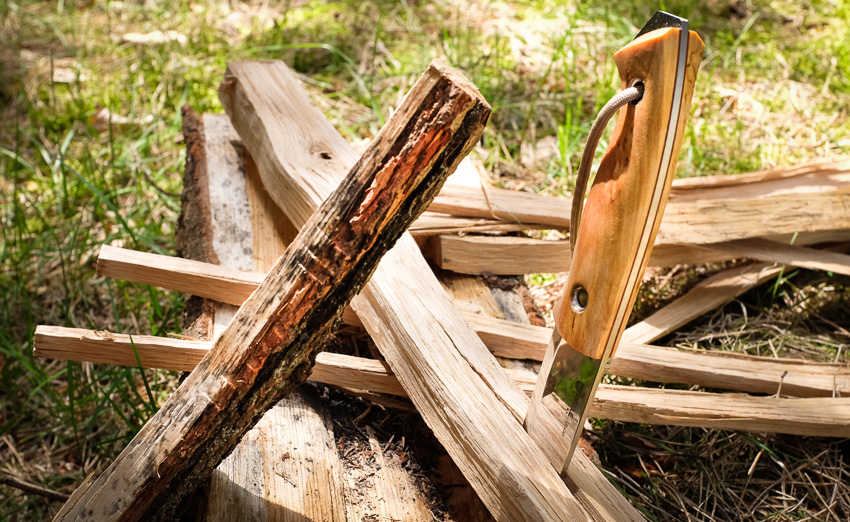
The Utværs spine has been ground perfectly square and it gives really good spark when used with a quality magnesium fire starter (I used a Swedish army model). It took me just 3-4 strikes to start a fire with on-site prepared tinder and feather sticks. The knife and rod is all you need to start a fire in any conditions of course only if you know what and how to do, so I always recommend training beforehand.
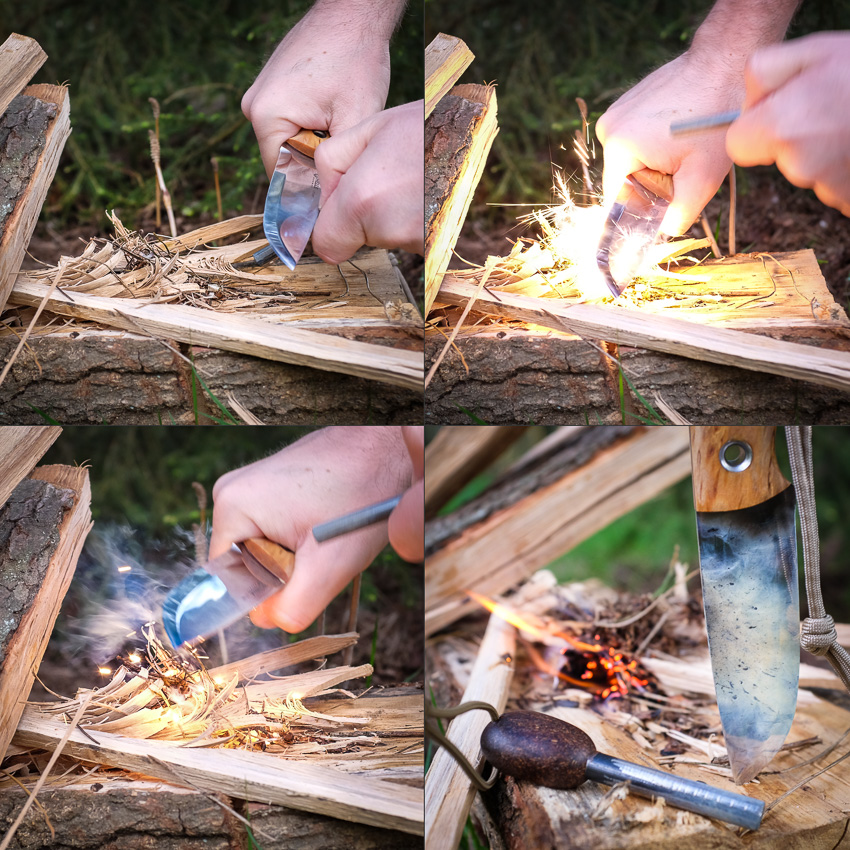
The sheath is typical for Helle lined, impregnated leather, and it works. There is a nylon plastic liner inside, which is something often overlooked in leather sheaths. But this liner has two very important jobs to do: it protects the sheath from being cut and, more importantly, it prevents the blade from direct contact with tanned leather (especially important when wet as this helps a lot to keep the blade free from stain and surface rust). The leather snaps nicely on the handle when you push the knife into the sheath. The belt loop is big enough for 2-inch belt and has been attached with special no twist rivet. Whats really cool is it fits perfectly into PALS webbing so you can easily attach it to a backpack, just as pictured below. Last but not least it fits into a cargo pocket if you have a slotted flap - in this case my TAD Gear F10s, but also other brands, including my favorite outdoor pants Fjallraven Barents Pro. So yeah, its a simple but still fine and functional sheath.
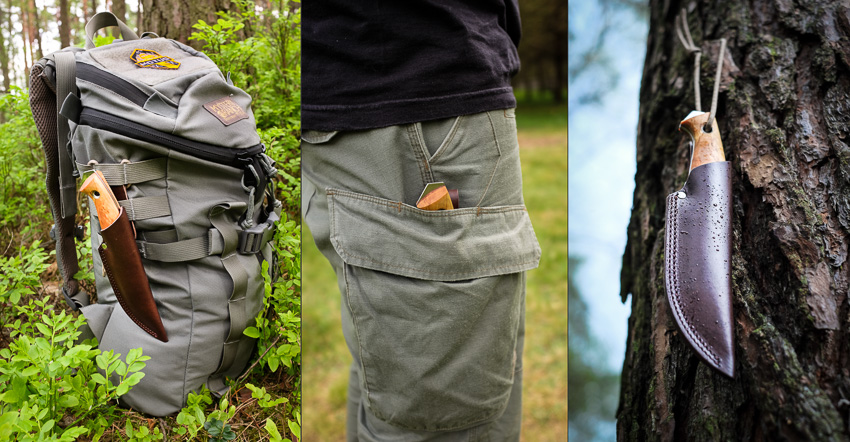
However, there are some people, who prefer kydex sheaths versus the traditional leather, especially in the US. So good news for you guys I made (myself) a kydex sheath for it and its really easy one to kydex. There are no negative angles and it doesnt require any extra liners and shims for kydexing. Its one of the easiest knives to kydex and the result is good and safe the Utvær snaps nicely into the sheath and requires moderate force to draw it again all thanks to the gentle curves of the handle. And last but not least you can easily attach a fire starter to a kydex sheath. Are there any negatives to my kydex sheath? Well, it doesnt fit my Fjallraven pants anymore (the sheath is too big) and it has lost its classic outdoor Scandinavian charm. So Ill probably use them both, but mostly the original leather one.
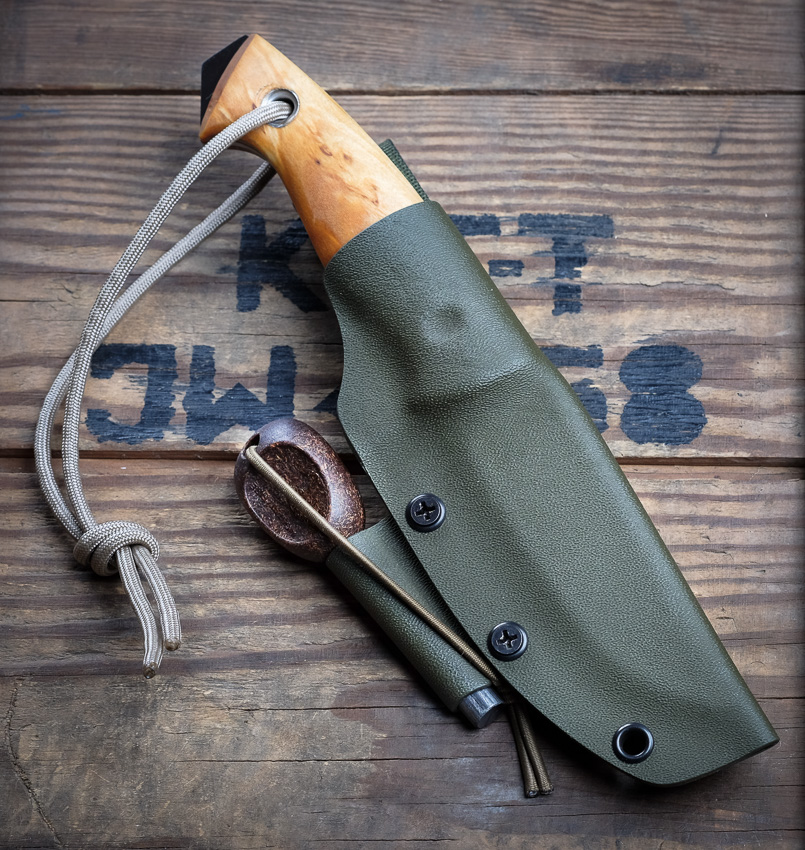
Are there any negatives to the Utvær? Not much, but there is no perfect knife, ha ha! First of all its not cheap and costs considerably more than most Helle knives. Its up to you to decide, but for me it was really worth the price. First of all its great design with a really experienced and successful knifemaker behind it. The materials are very good, the old school European manual craftsmanship and different construction (full tang) from most Helle are visible in the price tag. The price is not low, but it is still fair and easily explainable. Its just a premium Helle knife. As a suggestion for improvement: Id add a standard keeper for a magnesium fire starter to the sheath, Utvær gives such a good spark that it begs to be used for fire starting. Other than that you get pretty complete package, its very usable and with a non-intimidating look.
Get one, use it hard and itll serve you for many, many years. Surely even longer than my old scandi from my Boy Scout days! Of course Im keeping mine and itll have its new home in my wooden cabin in the forest.
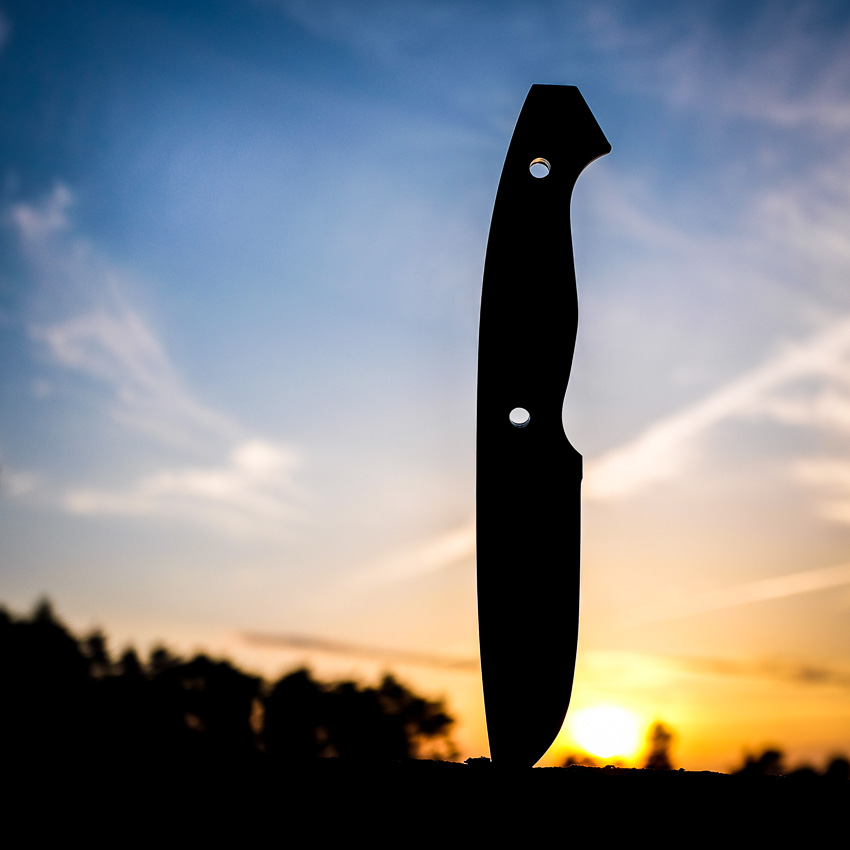
Review posted originally on PackConfig blog of my buddy from UK: HELLE UTVAER REVIEW and reposted below for you guys...

Scandinavian knives will always have a special place in my knife drawer. I remember when I joined the Boy Scouts and received my first belt knife, which was locally made and based on old military design, just scaled down a bit. During one of the summer camps we were visited by a Boy Scout group from Scandinavia and to seal our friendship we exchanged the knives. I received a traditional puukko with 4-inch carbon blade and birchwood handle. It was 26 years ago and yes, I still have that knife! I had to replace handle and make a new sheath, but I still have the scandi blade I was given 26 years ago. It was my first ever serious knife, which performs flawlessly even now after quarter of a century and serves as my forest cabin backup. When I discovered that one of my favorite European knifemakers, Jesper Voxnaes (known better just as VOX), designed a new scandi/bushcraft knife for Helle (a Norwegian manufacturer producing knives since 1932) I knew I had to get it in my hands as soon as I could. So here it is the Helle Utvær, displayed next to my own old puukko from Boy Scout times.

You can study all the technical specs on the Helle website: http://www.helle.no/products/knives/utvaer/
The Utvær comes in a standard Helle cardboard tube with a small brochure (including the history of Helle, knife care and sharpening instructions). There is also a square canvas cloth (possibly linen?) with company logo, which you can use for anything from wiping down your knife to a small tablecloth when preparing food on an old log in the forest. Yeah, I like the latter one, thats what Ill use it for. Thanks Helle.

There is a strong trend towards tactical knives these days, especially in the US. The problem is that in more and more countries, especially within Europe, tactical knives are perceived by authorities as illegal weapon-like items, regardless of the intended use. So its more than welcome to see a modern, talented knifemaker co-operating with a traditional and well-established company on a knife. It blends a classic Scandinavian style with modern design and solutions. This is a knife you can take into the Great Outdoors, in practically any country and I cant foresee any reason youd be questioned about why you have it on your belt. It just looks like a traditional outdoor/hunting knife, with a semi-polished blade, birchwood handle and a leather sheath. There is nothing tactical in its look: no black handle, no serrations, no anti-glare blade finish, no pronounced guard, no G10 and no kydex sheath. Its a perfect knife for hiking through any field or forest of the World. Its also a true Scadinavian knife as it blends all Scandinavian countries into one knife: classic Finnish scandi grinds, Danish designer, Swedish steel and Norwegian manufacturer. I think its pretty cool.

At first glance Utvær handle looks similar to other handles of Helle Knives. But its not the same. Utvær is a full-tang knife, so the steel tang goes through entire handle end-to-end. This ensures superior strength and longevity compared to traditional hidden tang construction (vide my first scadi knife, which had to have the handle replaced after I dropped it on a concrete floor and it cracked). But its also twice as expensive to produce because a knife producer can fit roughly only half of the number of blanks (compared to hidden-tang) on a standard steel plate for initial shape cutting.
The grip is traditional Scandinavian birchwood. The nicely grained and warm colored scales are fixed to the tang with two tubular bolts which gives you two potential lashing points. They are big enough to use not only with paracord, but even with a self-made thick leather thong or tendon string. And with two attachment points and a full-tang construction you can easily transform it into a spear if needed I doubt youd need a spear when hiking through a Scottish moor but what about backpacking in Bolivia or the Rocky Mountains? The handle is naturally shaped and really comfortable. It fills your fist nicely not too bulky but also not too thin or flat. Oil-impregnated unpolished wood is waterproof but it also gives a positive grip and its not too slippery, even when wet.

Another benefit of full-tang is the crusher at the pommel end its not only there for looks. You can use it to crush and hammer stuff (and save the blade just for cutting), to open metal container lids, break glass in an emergency, use it as a small wedge/prybar or even to strike a magnesium rod to start a fire. The Utværs 4.5-inch handle is equally comfortable with a straight, hammer and reverse grip, so you can use the blade and crusher for multiple applications.

The blade is a soul of a knife. The Utvær has been equipped with 4-inch blade, which is 3mm thick and made of Sandvik 12C27 steel. The 4-inch size makes it legal in almost all countries and 12C27 is a very good European made alloy, which is corrosion resistant and takes a very sharp edge. Its a particularly good choice for a bushcraft knife as its really not hard to re-sharpen in the field and, as I said, it takes easily shaving sharp edge and holds it well above average during work. The tip is sharp and strong, the straight part allows for easy woodworking and the belly is suitable for skinning. Of course the Utvær has Scandinavian grind geometry, which means its sharpened to zero-grind with just the burr removed at the final stage (so without a secondary bevel). That makes it incredibly sharp and optimized for woodworking, whittling, preparing feather-sticks (to start a fire) and also cutting all kind of meats, foods, leather, ropes, green vegetation etc. The blade finish is a mix of polishing and ultra fine satin, which makes it easy to clean and (by polishing) increases corrosion resistance. It also looks more like a woodsmans tool versus matte bead-blasted tactical blades. Another benefit it can be used as a signaling mirror in an emergency.

I tried it on many materials and I must say it really slices what you cut. First of all its a crazy-good whittler the comfortable handle transfers a lot of force to the polished zero edge and it just flows through the wood as if its cardboard. Take a look at the shavings here long, fat and smooth these were effortlessly cut off the pine stick. So the geometry of the Utværs blade is REALLY good for that.

Cutting through hemp rope checks the blades sharpness and edge holding capabilities. I started to cut and after about 60+ straight cuts I stopped. It was still very sharp and cutting effortlessly that looked good enough to me, so no need to continue. Whats important is that the edge was not rolled, and most of the edge length was still shaving sharp. Its well above average compared to most cheap production bushcraft/boyscout knives with a scandi grind. So yeah, the Utvær would make a more than decent camp kitchen knife for food preparation, cutting, chopping. But it would also work for spreading butter, crushing garlic etc. thanks to broad flat profile.

But there is much more you can do with the Utværs blade! What about preparing a fire? Its not a big blade but the full tang combined with good steel and broad profile means it is even good for some batoning. It was not a problem at all to split 2 inch wood pieces into splinters as you can see in the picture below I was hitting it hard enough to leave some clear marks on the improvised wooden baton. It took some serious beating without any issue.

The Utværs spine has been ground perfectly square and it gives really good spark when used with a quality magnesium fire starter (I used a Swedish army model). It took me just 3-4 strikes to start a fire with on-site prepared tinder and feather sticks. The knife and rod is all you need to start a fire in any conditions of course only if you know what and how to do, so I always recommend training beforehand.

The sheath is typical for Helle lined, impregnated leather, and it works. There is a nylon plastic liner inside, which is something often overlooked in leather sheaths. But this liner has two very important jobs to do: it protects the sheath from being cut and, more importantly, it prevents the blade from direct contact with tanned leather (especially important when wet as this helps a lot to keep the blade free from stain and surface rust). The leather snaps nicely on the handle when you push the knife into the sheath. The belt loop is big enough for 2-inch belt and has been attached with special no twist rivet. Whats really cool is it fits perfectly into PALS webbing so you can easily attach it to a backpack, just as pictured below. Last but not least it fits into a cargo pocket if you have a slotted flap - in this case my TAD Gear F10s, but also other brands, including my favorite outdoor pants Fjallraven Barents Pro. So yeah, its a simple but still fine and functional sheath.

However, there are some people, who prefer kydex sheaths versus the traditional leather, especially in the US. So good news for you guys I made (myself) a kydex sheath for it and its really easy one to kydex. There are no negative angles and it doesnt require any extra liners and shims for kydexing. Its one of the easiest knives to kydex and the result is good and safe the Utvær snaps nicely into the sheath and requires moderate force to draw it again all thanks to the gentle curves of the handle. And last but not least you can easily attach a fire starter to a kydex sheath. Are there any negatives to my kydex sheath? Well, it doesnt fit my Fjallraven pants anymore (the sheath is too big) and it has lost its classic outdoor Scandinavian charm. So Ill probably use them both, but mostly the original leather one.

Are there any negatives to the Utvær? Not much, but there is no perfect knife, ha ha! First of all its not cheap and costs considerably more than most Helle knives. Its up to you to decide, but for me it was really worth the price. First of all its great design with a really experienced and successful knifemaker behind it. The materials are very good, the old school European manual craftsmanship and different construction (full tang) from most Helle are visible in the price tag. The price is not low, but it is still fair and easily explainable. Its just a premium Helle knife. As a suggestion for improvement: Id add a standard keeper for a magnesium fire starter to the sheath, Utvær gives such a good spark that it begs to be used for fire starting. Other than that you get pretty complete package, its very usable and with a non-intimidating look.
Get one, use it hard and itll serve you for many, many years. Surely even longer than my old scandi from my Boy Scout days! Of course Im keeping mine and itll have its new home in my wooden cabin in the forest.

Last edited:

